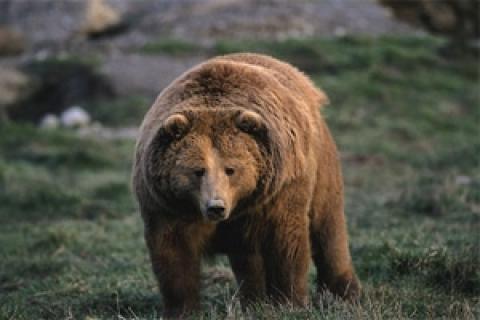
Seeing a bear while hunting is always thrilling. Sometimes it's a good thrill like seeing your first bald eagle. Other times it's a scary thrill, like seeing a rattlesnake coiled near your feet. Whether the experience is pleasant or frightening depends on the person's attitude.
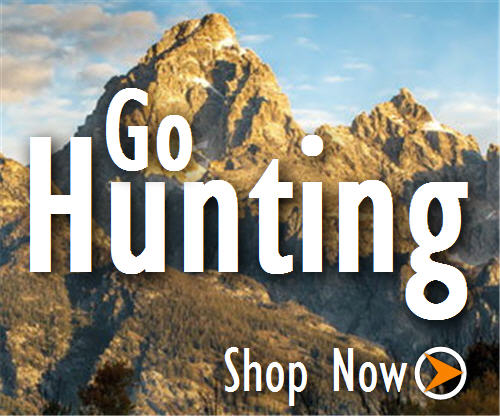 Bears are a valuable game species but many people are afraid of bears. They've heard stories of bear attacks and worry that a bear might attack them. Most hunters know, however, that bear attacks are extremely rare. In fact, there have been slightly more than 100 people killed in last 100 years by bears, both grizzly and black, in North America. Bears are discreet animals that are fairly uninterested in humans. If hunters learn to follow a few simple safeguards, the chance that a bear will cause problems is very small.
Bears are a valuable game species but many people are afraid of bears. They've heard stories of bear attacks and worry that a bear might attack them. Most hunters know, however, that bear attacks are extremely rare. In fact, there have been slightly more than 100 people killed in last 100 years by bears, both grizzly and black, in North America. Bears are discreet animals that are fairly uninterested in humans. If hunters learn to follow a few simple safeguards, the chance that a bear will cause problems is very small.
In the Fall - Bears Feed for the Coming Hibernation
The best chance of a hunter encountering a bear is in the fall. Bears, driven by the need to fatten up for the coming winter hibernation, are eating as much fatty food as possible and very active in their quest for calories.
Fall is also when most people go hunting. And where do we usually hunt? Most prefer to head to areas with small human populations — the same areas that bear like most. So sooner or later, bears and hunters are bound to meet. Because hunters are naturally quiet in the woods, we increase the chance of an encounter. It's important we know how to avoid surprising a bear and what to do if we encounter one.
Avoiding a Bad Bear Encounter
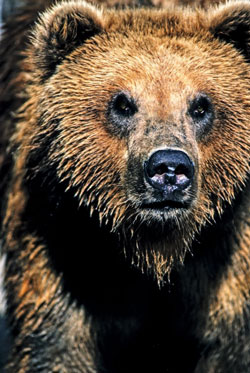 Bears are commonly shy and solitary animals. They prefer to avoid humans, and if they see, smell or hear you, they will nearly always retreat unless they are trying to protect their young. Most encounters between bears and humans occur with the human unaware that encounter even happened. Bears sometimes become bolder, however, if they are very hungry or have become "habituated" to humans. Most commonly, habituation happens when bears learn to associate humans with a food reward.
Bears are commonly shy and solitary animals. They prefer to avoid humans, and if they see, smell or hear you, they will nearly always retreat unless they are trying to protect their young. Most encounters between bears and humans occur with the human unaware that encounter even happened. Bears sometimes become bolder, however, if they are very hungry or have become "habituated" to humans. Most commonly, habituation happens when bears learn to associate humans with a food reward.
You also should remember that bears are easily surprised. This seems strange for such a large, powerful animal. But if you startle a bear, corner it or provoke it, it may perceive you as a threat. Bears are especially protective of their cubs and food carcasses they're feeding on.
When not hunting them, it's best to avoid bears if you can. There are several ways to do this:
- Learn to recognize bear sign, and avoid areas with fresh tracks, torn logs, flipped rocks, scats or clawed trees.
- Be extra cautious on windy days; it's harder for bears to hear and smell you coming. You also should be careful in areas where you can't hear or see well such as deep brush, along stream sides and at bends in a trail. Reduce your chances of surprising a bear by wearing a bear bell, clapping your hands, talking, singing or otherwise making noise. This lets any bears in the area know you are coming and that you are human. Bears can then move out of the area and avoid you. Avoid late evening trips and returning to camp in the dark.
- Always hunt with others. People who hunt alone or in groups of fewer than four people are more likely to have conflicts because bears tend to shy away from large groups of people. If children are in your hunting party, be sure they stay within sight of an adult.
- It's also a good idea to leave your dog at home or keep it on a leash. A dog chasing a bear or barking at it can cause real problems.
Handling Game in Bear Country
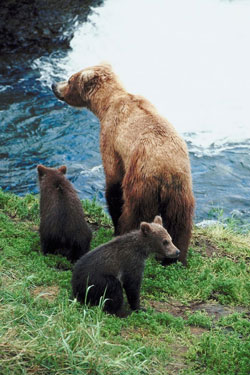 |
| If they see, smell or hear you, bears will nearly always retreat, unless they're trying to protect their young. |
If you're fortunate enough to harvest a game animal in bear country, there are a few additional precautions you should take:
- Wear gloves and an apron when dressing game to reduce odors on your clothing.
- When you gut an animal, separate the carcass from the entrails. Then quickly remove the carcass from the area. The longer a carcass is left in the field, the greater the chance of a bear-human conflict. Be sure not to leave entrails within one mile of a trail, campsite, picnic area or parking lot.
- Don't store game carcasses too close to camp or near a trail. Bears attracted by the smell may cause problems. You also should remember to take a pulley system and rope to camp so you can hang game out of reach of bears. Carcasses should be at least 10-15 feet above the ground and four feet out from the supporting structure.
- Hang game so it can be seen from a distance. This allows you to observe it when you return. If a bear has claimed the food for itself, you can avoid it. Surrender the carcass to a bear if he has already begun feeding on it.
- Hunting knives and other tools used when dressing game should be washed thoroughly and stored with your game.
Base Camp Precautions
Hungry bears also are attracted by the smell of food around camps. This, too, can cause problems unless you're careful.
Smart campers store all foods, including dog food and horse feed, in closed, bear-resistant containers or suspended above the ground as described above. They also keep sleeping bags, tents and sleeping areas free of food and beverage odors. And they never sleep in clothes that were worn while handling game or cooking.
Keep a clean camp. After meals, wipe down tables and chairs. Wash dishes and utensils immediately and dispose of wastewater downwind, at least 100 feet from your sleeping area. Store all odorous items such as food, garbage, toothpaste, deodorant, lotions, creams and sprays in bear resistant containers.
When leaving camp, pack all food scraps and trash in sealed plastic bags and take it with you for proper disposal. When these items are left behind or buried, they attract bears to campsites, increasing the chance of bad encounters either for you or the next campers.
What to do If You Meet a Bear
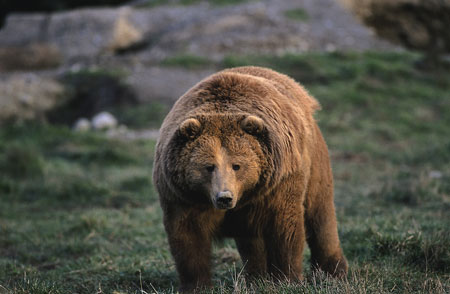 |
| The best way to defend against a bear attack is bear pepper spray. Misplaced gun shots may just wound the animal, making it even more dangerous. |
Even with an individual's best efforts, it is still possible to encounter a bear. Usually the bear will detect you first and leave the area. But if you meet a bear that doesn't retreat, here are some suggestions:
- Stay calm. If you see a bear and it has not seen you, calmly leave the area. Detour as far away as possible. As you move away, make noise so that the bear knows you are there.
- Give the bear a chance to identify you as human instead of a threat. If the bear stands up, it is trying to see, hear and smell you better. Speak softly while backing away. Avoid direct eye contact; the bear may think this is a threat. Continue backing away slowly and cautiously, retreating to a place of safety. Watch what the bear does, and adjust your actions accordingly.
- If the bear is close to a trail and you cannot pass it or return the way you came, wait for the bear to leave. If the bear approaches you, identify yourself as a human by allowing the bear to hear and see you. The bear should avoid you.
- Do not run or make sudden movements. Running may cause the bear to charge. Besides, you cannot outrun a bear, and they are capable of climbing trees.
If a Bear Charges, Spray, Don't Shoot
On very rare occasions, a bear might not retreat or avoid humans. Instead, it seems prepared to charge. What should we do?
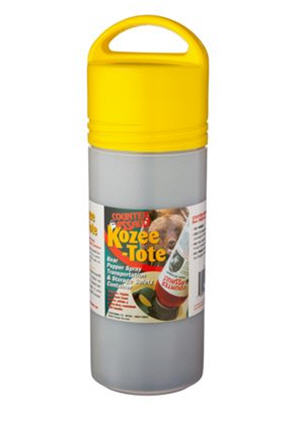 |
| Kozee-Tote Bear Pepper Spray |
We're hunting. We have a gun. So we should just shoot the bear, right?
Wrong. A misplaced shot may just wound the animal, making it even more dangerous. The best way to defend against a bear attack is bear pepper spray, like the Kozee-Tote Bear Pepper Spray. Everyone who hunts in bear country should keep a full can where they can quickly get to it. Bear pepper spray has been proven more effective than a gun during bear encounters.
Unlike a gun, bear pepper spray does not have to be aimed precisely to stop a charging bear. The spray unit makes a fog in the air. When the spray hits the bear, it dilates the capillaries of the bear's eyes and causes temporary blindness. It also makes the bear choke and cough. According to experts, there is no better way to stop an attack by an aggressive bear.
When you buy pepper spray, be sure the container says the product is made for stopping or preventing bear attacks. Other types of personal defense sprays may not work.
Also, be sure the canister contains at least nine ounces of spray; smaller cans than this may not last long enough or spray far enough to stop a bear's charge.
Always carry the can with you in the field and in camp. Keep it in a hip pouch or chest holster where you can quickly reach it. In your tent, keep the spray next to your flashlight.
In the event of an attack, remove the safety clip from the can. Aim slightly down and toward the approaching bear. Spray a brief shot when the bear is about 50 feet away. Then spray again if the bear continues to approach.
When the animal retreats or stops to clean itself, leave the area as quickly as possible without running. Go to a safe area such as a car or building. Do not chase or pursue the bear.
Remember, bears aren't really mean. They aren't man-eaters, and they usually want nothing to do with us. When we have a bad encounter, it's because the bear usually is acting defensively rather than aggressively. By understanding the behavior and needs of bears, we can avoid unpleasant encounters. And when we see a bear, it will be a good thrill, not a bad one.
- 17284 views

